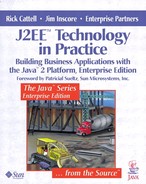1.1. The Networked Economy
There are shelves of books that describe the new networked economy, so we won't rehash those here. Simply put, in the networked economy, the exchange of information is as important as the exchange of goods and services. Even companies in traditional businesses find they have to develop new techniques for managing, disseminating, and taking advantage of their information resources. Companies need to network, to reach out to new customers, to interact more effectively with their suppliers, to engage in alliances with new partners.
This economy is largely propelled by the Internet, but it also takes in other networks, such as wireless networks of cellular phones and hand-held devices, corporate intranets, and a variety of other networks, local and wide-area. The networked economy is built on two software entities: data and applications.
Historically, the emphasis of information technology has been data management—that is, large-scale database management systems have allowed organizations to gather, analyze, and interpret data for strategic advantage. In the networked economy, the emphasis of information technology shifts toward applications. Distributed computer applications are the key to reusing existing data and accessing new data. Applications are the key to establishing secure and robust links with customers, suppliers, and partners. Thus, the key to competing effectively is the ability to quickly and efficiently develop and deploy innovative applications as new opportunities arise.
The Java 2 Platform, Enterprise Edition, is designed to provide a standard for developing and deploying the applications required to take advantage of the reach of the networked economy.
